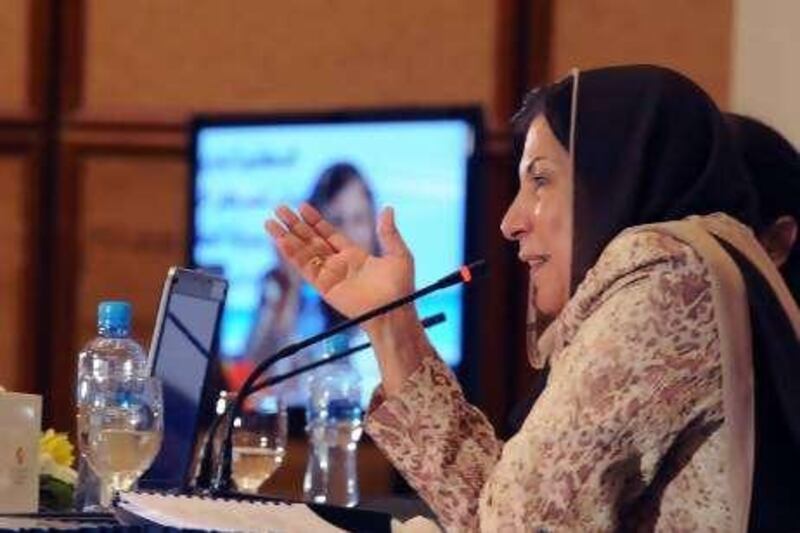MANAMA // Official campaigning for October's parliamentary elections starts next week against a background of unusual political turmoil and with an important segment of Bahrain's population determined to make significant electoral progress: women. The attention of Bahrain's voters is being pulled in many directions. The country's economy has flagged, unemployment has surged and security has now taken a front-row seat in this island nation of 728,000 people.
Over the weekend, authorities accused 23 detained Shiite activists, including prominent clerics and political leaders, of promoting terrorism and plotting to overthrow the monarchy. On Sunday, King Hamad bin Isa Al Khalifa said the government would step up efforts to regulate mosques and religious forums to ensure that none will be used to promote violence. On Monday, Bahrain's crown prince and prime minister both sent the king messages backing his speech. Prime Minister Sheikh Khalifa bin Salman Al Khalifa said the government would ensure that places of worship are run by those who promote "the values of tolerance and moderation".
Sheikh Mohammed bin Rashid, Vice President of the UAE and Ruler of Dubai, also called King Hamad to offer his support. For Amal Fareed, the recent unrest is a distraction from the election. She hopes the next parliament will focus on issues such as housing, education and health care, and she is especially keen to see that at least one of the elected politicians pushing these key issues is a woman.
None has ever won a contested seat in a Bahraini election and the time for it, she says, has come. "I am really hoping that a woman will win," said Ms Fareed, 27, naming the prominent secular politician Muneera Fahkro as her ideal choice. The disquiet has not deterred women such as Mariam al Rowaie from trying to make history. Bahraini women have found it hard to get financial backing or support from political parties for their candidacies. They also find it hard to allay the worries of conservatives who believe women have no place in the 40-seat parliament.
Despite that past - or perhaps because of it - Ms al Rowaie, an independent running in East Rifaa, is convinced that the recipe for electoral success is not to run as a "women's candidate". "In the election we will focus not just on women, but what all the people in my area need - men and women," she said. "I will focus on people's needs because my area is very poor and people need employment and to raise their standard of living." But Ms al Rowaie, president of the Bahrain Women's Union and one of only a handful of women who have announced plans to run in the election on October 23, concedes it will not be an easy task.
"I don't know if I have a good chance, but the main idea is that as women we must stand and say, 'We are here'," she said. After losing out in a closely fought race in 2006, Muneera Fakhro is also running again with the liberal Waad party. "We want to be an alternative for the people," Ms Fakhro said. "I am running as a woman and a citizen, but mainly as a citizen. We [Waad] represent men and woman, Shia and Sunni."
Ms Fakhro believes unemployment and the demand for housing on the island are some of the issues of primary concern for both male and female voters. If elected, she said she could also focus attention on human rights. "Women's rights are human rights," Ms Fakhro said. "Having a women elected by the people will raise the status of women in society - in the workplace and everywhere." Bahraini women are not new to campaign politics. After a raft of political reforms were introduced by King Hamad, Bahrain's first elections were held in 2002, with eight women running for office. Although none was elected, the number of female candidates grew to 18 in the 2006 election. Still, only one woman gained a seat when she stood unopposed in her district.
Since the elections in 2006, organisations such as the Supreme Council for Women, a government body, and the United Nations Development Programme have been actively working towards female political empowerment. According to Sayed Aqa, the UN's resident coordinator in Bahrain, one of the main challenges is encouraging political parties and voters to support female candidates. So far, only Waad has named a woman among its candidates. Despite some expectations, no women were among a preliminary list of candidates released recently by Al Wefaq, the largest opposition party. "We strongly call on all political societies to field female candidates," Mr Aqa said. "It is important to elect women, but equally important for female candidates to run effective campaigns so they can remove perceptions in terms of society viewing women as not as qualified as men."
This sentiment was echoed by Badria al Awadhi, the Kuwaiti women's activist and lawyer, during a recent discussion on the role of women in the forthcoming election. Among those who turned up to Ms al Awadhi's lecture was Amal Mohammed, 39, who is hopeful that at least one of Bahrain's female candidates will be able to emulate the success of Kuwait's four female MPs. "There has to be women in the parliament because they know the problems and issues of other women," she said. "Hopefully, this year there will be more than one woman in the parliament."
But for this to happen,Ms al Awadhi stressed that they must avoid pigeonholing themselves simply as "female candidates" and urged them not to rely on the female vote. "Bahraini women are very responsible and good to do the job, so they should be given a chance to represent the people," she said. "I'm optimistic a woman will be elected." Despite losing out in 2006, Sabah al Dosari is running as an independent in the October 23 municipal elections after being encouraged by women in her constituency."There is a difference between 2006 and 2010 - there was a big change after the Kuwaiti ladies won," Mrs al Dosari said. "All the ladies in my area want to push a lady to win. I think this time there is a good chance that at least one lady will win."
However, voters such as Amal Fareed fear that recent events - including the outbreak of violent protests following the arrests of opposition figures in mid-August accused of being part of a terrorist network - have heightened sectarian tensions. This is something she believes may affect voting on October 23. "For the past eight years the parliament has been focusing on side issues that are not related to the day-to-day lives of Bahraini citizens," she said. "I'm hoping against hope that this time it turns out differently." zconstantine@thenational.ae





